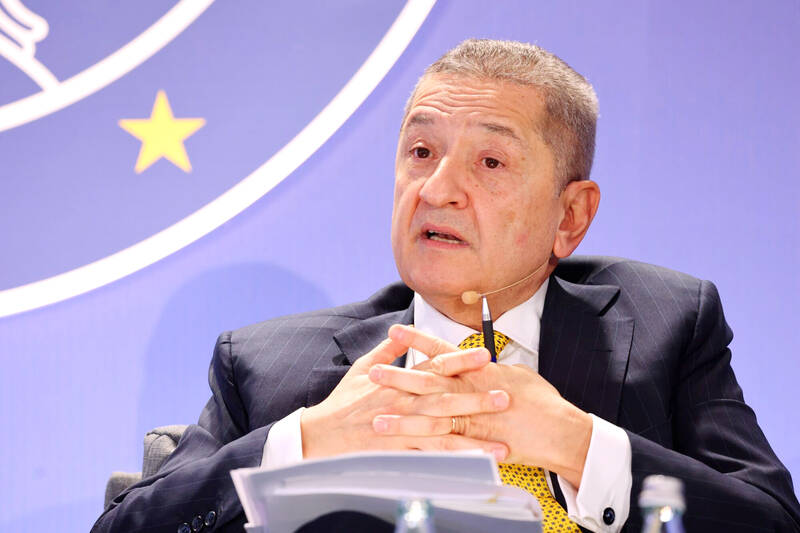The European Central Bank (ECB) will soon need to start cutting interest rates, according to Governing Council member Fabio Panetta.
“Macroeconomic conditions suggest that disinflation is at an advanced stage, and progress toward the 2 percent target continues to be rapid,” he said on Saturday at the annual Assiom Forex event in Genoa. “The time for reversal of the monetary policy stance is fast approaching.”
ECB officials are preparing to loosen policy this year — probably from April or June — with investors leaning toward the earlier of the two. The outcome will hinge on inflation, which has plunged over recent months but isn’t expected to meet the 2 percent target again until next year.

Photo: Bloomberg
“There has been no upward de-anchoring of inflation expectations — if anything downside risks are emerging,” Panetta said. “Concerns about the hypothesis of persistently high core inflation have also proven groundless.”
Several policymakers have suggested wage increases could feed through to consumer-price growth and the ECB needs to wait for those data. The dovish Italian central bank chief said such a threat is exaggerated.
“The risk remains that still strong nominal wage growth could reignite inflation,” Panetta said.
He also warned against delaying a move too much.
“If monetary policy were to take too long to accompany the ongoing disinflation, downside risks to inflation could emerge that would conflict with the symmetrical nature of the objective set by the ECB’s Governing Council,” he said.
Across the Atlantic, US Federal Reserve Bank of Dallas President Lorie Logan said she sees no urgency to cut interest rates right now, adding that policymakers have time to assess incoming economic data.
The comments are similar to those made by other policymakers, including Fed Chair Jerome Powell, who have indicated they are in no rush to start lowering rates. Policymakers have left rates unchanged since July last year and have signaled that the next move is likely a cut.
In separate comments on Friday, Atlanta Fed President Raphael Bostic said the central bank must ensure inflation returns to its 2 percent target, emphasizing a need to “stay the course.”

Semiconductor shares in China surged yesterday after Reuters reported the US had ordered chipmaking giant Taiwan Semiconductor Manufacturing Co (TSMC, 台積電) to halt shipments of advanced chips to Chinese customers, which investors believe could accelerate Beijing’s self-reliance efforts. TSMC yesterday started to suspend shipments of certain sophisticated chips to some Chinese clients after receiving a letter from the US Department of Commerce imposing export restrictions on those products, Reuters reported on Sunday, citing an unnamed source. The US imposed export restrictions on TSMC’s 7-nanometer or more advanced designs, Reuters reported. Investors figured that would encourage authorities to support China’s industry and bought shares

FLEXIBLE: Taiwan can develop its own ground station equipment, and has highly competitive manufacturers and suppliers with diversified production, the MOEA said The Ministry of Economic Affairs (MOEA) yesterday disputed reports that suppliers to US-based Space Exploration Technologies Corp (SpaceX) had been asked to move production out of Taiwan. Reuters had reported on Tuesday last week that Elon Musk-owned SpaceX had asked their manufacturers to produce outside of Taiwan given geopolitical risks and that at least one Taiwanese supplier had been pushed to relocate production to Vietnam. SpaceX’s requests place a renewed focus on the contentious relationship Musk has had with Taiwan, especially after he said last year that Taiwan is an “integral part” of China, sparking sharp criticism from Taiwanese authorities. The ministry said

US President Joe Biden’s administration is racing to complete CHIPS and Science Act agreements with companies such as Intel Corp and Samsung Electronics Co, aiming to shore up one of its signature initiatives before US president-elect Donald Trump enters the White House. The US Department of Commerce has allocated more than 90 percent of the US$39 billion in grants under the act, a landmark law enacted in 2022 designed to rebuild the domestic chip industry. However, the agency has only announced one binding agreement so far. The next two months would prove critical for more than 20 companies still in the process

CHANGING JAPAN: Nvidia-powered AI services over cellular networks ‘will result in an artificial intelligence grid that runs across Japan,’ Nvidia’s Jensen Huang said Softbank Group Corp would be the first to build a supercomputer with chips using Nvidia Corp’s new Blackwell design, a demonstration of the Japanese company’s ambitions to catch up on artificial intelligence (AI). The group’s telecom unit, Softbank Corp, plans to build Japan’s most powerful AI supercomputer to support local services, it said. That computer would be based on Nvidia’s DGX B200 product, which combines computer processors with so-called AI accelerator chips. A follow-up effort will feature Grace Blackwell, a more advanced version, the company said. The announcement indicates that Softbank Group, which until early 2019 owned 4.9 percent of Nvidia, has secured a